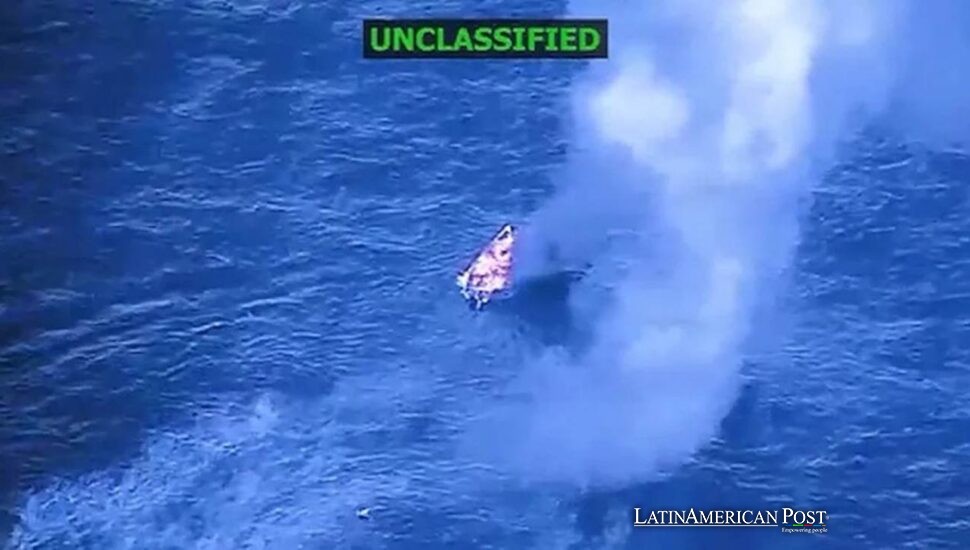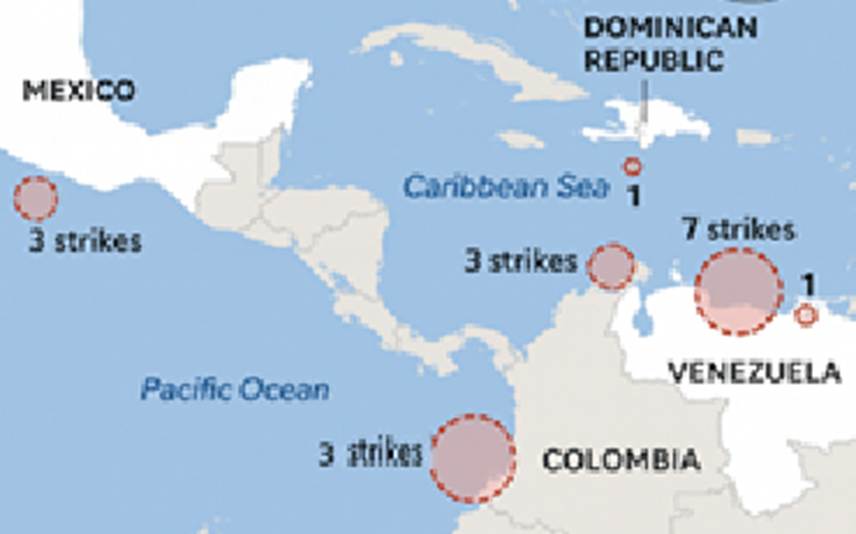Colombian Fishermen Caught Between Cartel Wars and Washington’s Distant Guns

On Colombia's Caribbean shore, families who once feared storms and pirates now talk about something stranger and more terrifying: unseen American drones and missiles that can turn a wooden fishing boat into splinters. Washington calls it self-defence. Coastal communities fear they could vanish without a trace.
A missing uncle on a postcard bay
From the bay of Taganga, where bright skiffs bob in turquoise water and tourists pose for photos at sunset, Lizbeth Pérez stares toward the horizon and thinks about a boat that never came back.
In September, her uncle, 43-year-old fisherman Alejandro Carranza, left before dawn as he always did. He set out towards La Guajira, the wild stretch of coast that hugs the border with Venezuela. He said goodbye to his family, started the engine, and pushed into the dark. No one has seen him since.
The next day, US President Donald Trump announced that a vessel that had departed Venezuela had been hit in international waters. Three people he described as "extraordinarily violent drug-trafficking cartels and narco-terrorists" were killed. In Taganga, Carranza's relatives heard the news like a punch. They fear he was one of the three.
They have no official confirmation. Nobody. No clothes washed up on a beach. Just television reports and shaky clips passed from phone to phone. For Carranza's five children, the uncertainty is almost its own kind of violence. "He was a kind man, a good person, a friend," Pérez told The BBC, remembering a father who taught his kids to read the sea and who rarely left it.
In Taganga's bars, tourists sip beers in front of perfect Caribbean views. A few blocks away, the Carranza family crowd into a small house in nearby Gaira and argue over whether to keep hoping. Out here, the US "war on drugs at sea" is not a speech in Washington. It is the question of whether a man who is left to fish will ever walk through the door again.
Washington's distant guns over warm water
Carranza's disappearance is part of a new phase in US drug policy that has quietly moved the battlefield offshore. Since September, the United States has begun targeting boats it says are carrying drugs in the Caribbean, later expanding the operations into the eastern Pacific. According to US briefings, at least 21 strikes have killed 83 people so far.
US Defence Secretary Pete Hegseth says the goal is to remove "narco-terrorists from our hemisphere" and to stop "the drugs that are killing our people" from reaching American cities. The Trump administration argues that if cocaine kills thousands of US citizens each year, then destroying suspected traffickers' vessels in international waters is a form of self-defence.
To support that claim, the administration has told Congress it considers the US to be in a "non-international armed conflict" with regional drug cartels. The language is dry, but the consequences are not: by framing the campaign as a kind of war, Washington asserts the right to treat crews on these boats as enemy fighters, not criminal suspects.
Human rights lawyers across Latin America hear alarm bells. Under international humanitarian law, civilians can only be deliberately killed if they are directly taking part in hostilities and pose an imminent threat. Running drugs, however illegal, is not the same as firing a weapon. It is not, on its face, a capital offence.
US lawyer Daniel Kovalik, who represents some of Carranza's relatives and also advises Colombian President Gustavo Petro, told The BBC he plans to sue the US government on the family's behalf. In his view, these are extrajudicial killings carried out far from any battlefield, against people who should be arrested and tried, not vaporised. He notes that drug trafficking is not punishable by death in either Colombia or the United States.
American officials highlight an 18% rise in cocaine seizures in 2024 compared with the previous year and say the new tactics are hurting cartels' business. But in the United States, most overdose deaths are driven not by Colombian cocaine but by synthetic opioids such as fentanyl, primarily produced in and trafficked from Mexico. For people in Taganga and La Guajira, that disconnect fuels a bitter question: whose lives are being risked to fight whose crisis?

Petro, Trump, and a fracture between allies
Gustavo Petro, Colombia's left-wing president, has emerged as one of the most outspoken critics of the US campaign. He says Colombian citizens were on board the vessel struck on September 15 and has publicly alleged that Carranza himself died in the attack.
The White House hit back, saying it expected Petro to "publicly retract his baseless and reprehensible statement". Trump has accused the Colombian leader of encouraging drug production and has threatened to cut US aid, turning what used to be a tight security partnership into a very public quarrel.
Petro has tried to humanise the man at the centre of the storm. Earlier this month, he described Carranza as a father trying to scrape together enough money to send his daughter to university. The president said that out of desperation, the fisherman allegedly accepted a trafficker's offer to carry drugs to an island when his boat was hit. Whether the ship was carrying "fish or cocaine", Petro argued, it should not have been turned into a coffin from the sky. He has called the strikes "murder" by a foreign power.
In a dramatic gesture, Petro announced that he had ordered Colombian security forces to suspend intelligence co-operation with Washington until the strikes stop. His own defence minister later softened the line, saying information sharing against traffickers would continue. The mixed messages reflect the tightrope Colombia walks: defending its citizens and sovereignty while still relying on US funding, equipment, and intelligence in the drug war.
Inside the Carranza home, these geopolitical arguments feel distant and very close at the same time. The family acknowledges that Alejandro had a past conviction for stealing police weapons nearly a decade ago. They, however, reject the image of him as a cartel boss. Pérez insists that what the US president is doing "isn't right", telling The BBC that Washington should prove who is actually trafficking drugs instead of blowing up boats and deciding guilt from afar.
Kovalik, the family's lawyer, also disputes the self-defence claim. These vessels have never attacked the United States, he says. If they truly posed a threat, heavily armed warships could intercept them, board them, and bring their crews before a judge. Missiles are faster. They also erase evidence.
Fishermen between hunger, drones, and great-power games
Far from Capitol Hill and presidential podiums, the fishermen of Colombia's Caribbean coast are quietly changing how they look at the sky.
In Taganga, 81-year-old Juan Assis Tejeda has spent seven decades on these waters, as did his father and grandfather. His skin is darkened and cracked by the sun, his life measured in tides and tuna seasons. But lately, he says, he shares the horizon with something new: uncrewed aircraft.
He describes seeing drones gliding high above his boat when he is far offshore, sometimes 60 miles out chasing fish near the border with Venezuela. They hang almost motionless, then vanish. They do not roar like planes. They appear, "hover quietly, come back again, and disappear," he told The BBC. For the first time in a lifetime at sea, Tejeda admits he feels genuine fear. "At any moment they could see us and think we're doing the same thing," he says, meaning drug smugglers.
He does not pretend poverty is irrelevant. Older fishermen like him know how tempting it can be when someone offers a stack of cash to carry a package on an already-planned route. Boats are old, fuel is expensive, and fish stocks are fickle. Tejeda recalls being approached and saying no, choosing instead to keep living on modest, legal earnings "peacefully", rather than risk prison or something worse. He also knows that others have said yes, and that now, in the eyes of distant operators watching screens, every small boat looks suspicious.
Along the coast, many quietly believe the real target of this campaign is not just the skiffs, but the government in Caracas. For years, the US has accused Venezuelan President Nicolás Maduro of leading a trafficking network dubbed the Cartel de los Soles, allegations he denies. Washington plans to label it a foreign terrorist organisation, raising the stakes and opening the legal door to even more aggressive actions.
That, in turn, has sparked rumours in fishing villages about what would happen if the strikes moved from sea to land. Could there be missiles launched at Venezuelan ports? Will the conflict creep closer to Colombian shores?
Trump has hinted that the US "may be having some discussions with Maduro", while the Venezuelan president has said he is ready to talk "face to face". Diplomacy and escalation hang side by side.
For families like the Carranzas, those words translate into a daily ritual: watching the sea, waiting for a man who may already be gone, and wondering how a village of fishermen ended up in the crosshairs of a war that was never really about them.
Also Read: Puerto Rico’s Sapo Concho Leaps from Pop Cameo to Conservation Crusade




